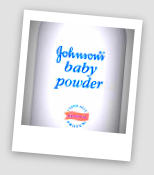A St. Louis jury yesterday hammered Johnson and Johnson and announced a $70 million talcum powder ovarian cancer verdict, in the third talcum powder ovarian cancer case to go to trial.

Deborah Giannecchini, 62, used Johnson & Johnson’s (J&J) baby powder for feminine hygiene for more than four decades until her diagnosis with ovarian cancer three years ago.
Giannecchini has an 80 percent chance of dying in the next two years, and has undergone surgery, radiation and chemotherapy.
J&J and Imerys Hammered
A J&J unit was ordered to pay $65 million in punitive damages and 90 percent of about $2.5 million for medical costs and pain and suffering.
Co-defendant Imerys Talc America, the supplier of the talc, was hit with $2.5 million in punitive damages.
Juror: “J&J Didn’t Care”
As reported in Bloomberg News, the company should have provided a warning label on the product to let consumers decide whether to use talc, one juror Billie Ray, 76, of St. Louis, said after the trial. “It seemed like Johnson & Johnson didn’t pay attention,” she said. “It seemed like they didn’t care.”
What is Talc?
Talc is a mineral that is mined around the world, including the U.S. Talc is the softest of minerals, and the rock is crushed into a white powder. Talc has been widely used in cosmetics and other personal care products to absorb moisture since at least 1894, when Johnson & Johnson’s Baby Powder was launched.
Risk factors for Ovarian Cancer
There are many risk factors known to increase a women’s risk of ovarian cancer include age, obesity, use of estrogen therapy after menopause, not having any children, certain genetic mutations and personal or family history of breast or ovarian cancer.
Medical research that began connecting talcum powder to ovarian cancer in the 1970s. Case studies have reported that women who regularly use talc on their genital area face up to a 40 percent higher risk of developing ovarian cancer.
The International Agency for Research on Cancer classifies genital use of talc as “possibly carcinogenic.” The National Toxicology Program, made up of parts of several different government agencies, has not fully reviewed talc.
Over 2,000 Talcum Powder Ovarian Cancer Lawsuits
J&J is accused in over 2,000 lawsuits in state and federal court of ignoring medical studies linking its baby powder and Shower-to-Shower talc products to ovarian cancer and failing to warn female users about the risk.
The most recent verdict follows personal injury and product liability verdicts of $72 million and $55 million against the company this year in the first two talc trials in St. Louis. Both are on appeal.
Each of those trials resulted in a multi-million dollar damage award due to the failure to provide appropriate talcum powder warnings for women.
According to US News, two lawsuits in federal court New Jersey (home state for J&J) were dismissed by a judge who said there wasn’t reliable evidence that talc leads to ovarian cancer, an often fatal but relatively rare form of cancer.
Ovarian cancer accounts for about 22,000 of the 1.7 million new cases of cancer expected to be diagnosed in the U.S. this year.
Lawsuits accuse J&J of marketing toward overweight women, blacks and Hispanics — the very same women most at-risk for ovarian cancer.
Factors known to increase a women’s risk of ovarian cancer include age, obesity, use of estrogen therapy after menopause, not having any children, certain genetic mutations and personal or family history of breast or ovarian cancer.
Medical Studies Talcum Powder Ovarian Cancer Link
The link between ovarian cancer and talcum powder was first discovered in 1971 in a study that revealed talc particles, the main ingredient used in Baby Powder, were found in the ovarian tissue of cancer patients.
This was the first instance in which medical professionals realized women were at risk when using the powder on their genitals, sanitary pads, diaphragms, and in condoms.
This study and subsequent studies are now at the heart of lawsuits filed against Johnson and Johnson, the makers of Baby Powder.
Our office is currently investigating talcum powder lawsuits from across the country. If you or a loved one suffered from ovarian cancer after using baby powder for feminine hygiene, contact our office immediately.
The case is Hogans v. Johnson & Johnson, 1422-CC09012-01, Circuit Court, St. Louis City, Missouri (St. Louis).





